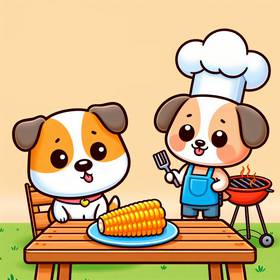The Health Benefits of Corn for Dogs
Corn, when included in a dog’s diet in moderation, can offer several health benefits. Here’s why:
1- Nutrient-Rich: Corn contains essential nutrients like fiber, vitamins, and minerals. These contribute to overall well-being and support a healthy immune system.
2- Digestive Aid: The fiber in corn aids digestion by promoting regular bowel movements and preventing constipation.
3- Energy Boost: Corn provides a quick source of energy due to its carbohydrate content.
Remember, while corn can be beneficial, always consult your veterinarian before introducing any new food to your furry companion.
1- Nutrient-Rich: Corn contains essential nutrients like fiber, vitamins, and minerals. These contribute to overall well-being and support a healthy immune system.
2- Digestive Aid: The fiber in corn aids digestion by promoting regular bowel movements and preventing constipation.
3- Energy Boost: Corn provides a quick source of energy due to its carbohydrate content.
Remember, while corn can be beneficial, always consult your veterinarian before introducing any new food to your furry companion.
How Much Corn Can Dogs Safely Consume?
Corn is a common treat for dogs, but moderation is key. While corn offers nutrients like protein, carbohydrates, and fiber, it should only complement your dog’s diet, not dominate it. Treats, including corn, should constitute no more than 10% of a dog’s daily intake. Overfeeding can lead to obesity and digestive issues.
Always remove the cob, as it poses a choking hazard and can cause intestinal blockage. For small dogs, a few teaspoons of corn are enough, while larger breeds may handle a quarter cup. Consult your vet for personalized advice, especially if your dog has a sensitive stomach or food allergies. Remember, each dog is unique, and their tolerance to different foods can vary.
Always remove the cob, as it poses a choking hazard and can cause intestinal blockage. For small dogs, a few teaspoons of corn are enough, while larger breeds may handle a quarter cup. Consult your vet for personalized advice, especially if your dog has a sensitive stomach or food allergies. Remember, each dog is unique, and their tolerance to different foods can vary.



